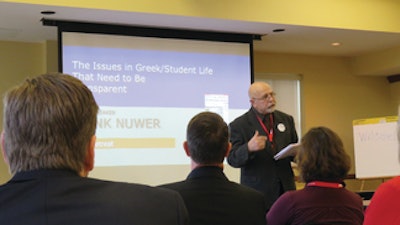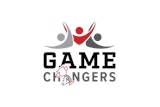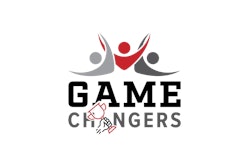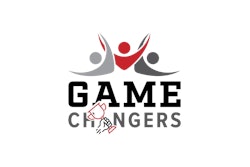
Though never hazed as a college athlete or team manager himself, Hank Nuwer has had an interest in hazing ever since he, as the University of Nevada-Reno’s graduate student president, witnessed a student frothing at the mouth under a pool table from excess alcohol consumption. It was an episode that Nuwer didn’t report to police and, subsequently, the same group of perpetrators hazed and killed a football player. It was 1975, and Nuwer began compiling a database of hazing-related fatalities — the Unofficial Hazing Clearinghouse — that he still maintains today. A former Human Behavior and Inside Sports reporter and the current managing editor of the Fairbanks Daily News-Miner in Alaska, the 77-year-old has also authored five nonfiction books on hazing, one fictional novel, and too many book chapters and articles to count. AB senior editor Paul Steinbach, having posted two unrelated hazing accounts to AB Today on July 19, talked to Nuwer — who was working on an introduction for the forthcoming scholarly book Hazing In The New Millenia — about the persistence of a practice that can ruin careers and end lives.
Are you noticing any trends in your data?
In terms of deaths, there hasn’t been one for a while, which is good, because it had been every year from ’59 to 2021. It’s not long enough to say that’s a trend and it’s ended, that’s for sure, because there have been so many close calls. If I could go back, I would have kept track of the close calls. The problem is a lot of the close calls never make the paper.
How do you monitor hazing cases for the Clearinghouse? Does it take a headline about a fatality?
Or, and very commonly, even before it hits the paper, an email — because of the database. Not every parent, but when there’s a death, nearly all of them will be on the phone or calling hazing prevention to get my number.
Does it surprise you after all these years and all these scandals and tragedies that we’re still talking about hazing in 2023?
No, because I just had this personal experience. I did my column on the hazing incidents that were happening in college, and then I got so many letters, “How could you be ignoring the Fairbanks hazing?” That occurred at West Valley High School here in 2019, conducted by a coach, ex-Marine, where he had the players jump into a pool fully dressed, take their clothes off, put them back on again, and the assistant coaches finally dove in and rescued three kids who were then hospitalized. I’d never heard of this, because it was never called hazing. It was a team-building exercise. So, I’m going to write about it now. This was a teacher with over 30 years of experience, his rank was major in the reserves, and he had them do this quote-unquote team-building exercise. And so that was kind of interesting to me — the euphemism. Surprised? No. Shocked? Every time, yes, that a coach would be doing something, whether it be Miami of Ohio, the swimming coach who was captured on film drinking while his athletes were being hazed, that he was only suspended for a short time. And he was kind of outraged that I wrote about him, and he actually contacted me. So, when it involves a coach, yeah, shocked, with all the knowledge that’s out there, that a coach would endanger his kids.
Is there anything about organized sports that make them particularly susceptible to a hazing mindset among participants?
An incredible respect for seniority, and the idea of precedence — putting the rookie in his or her place.
You just mentioned the term “team-building.” I’m guessing you hear team-building said more often in the sports context than, say, a fraternity context.
Yes, totally. You hear words like “toughening them up” or the equivalent in the fraternity, which is a more military kind of phrase. When I started tracking and looking at high school hazing in sports in the ’80s, that’s when it really was emerging. In the ’80s, whenever a coach was caught with it, they were calling it team-building. One example was a high school in South Carolina, and the coach was endangering them with a kind of battery, to make them shocked. After my article, he said, “Well, don’t worry, we’re not doing that anymore. We just take them out to a manure pile and make them carry things in a spoon.” Come on.
Anything about the details of the player allegations at Northwestern shock you?
No, not shocked, but there’s always a goofy name associated with these things, so they don’t have to call it hazing. Maybe that’s part of what helps with the justification. I guess the only thing is that it was kept silent for so long, apparently. You know, that over a course of time, it’s getting harder and harder to keep that under wraps.
The Northwestern hazing allegations mention nudity in different contexts, as well as contact of a sexual nature among players. Does hazing often involve a sexual component?
It does. I’m a little hesitant to say the word often, but yes, it goes back some time. I mean, the University of Vermont had a hockey team that was canceled for a year. That had it. It does have that component, and it’s usually kept quiet at the fraternity level, although now people are coming forward. But band and athletics, I heard quite a few of these episodes, and they have stupid names like “elephant walk,” where they’re having to hold each other’s parts.
Though the Northwestern case didn’t involve death, do you still read past the headlines to learn what happened?
I always do that, so I can write about what happened. I’ve already gone into this West Valley case, and the fact that Alaska doesn’t have a hazing law. The Democrats tried to get it passed, and Republicans defeated it about 10 years ago. And I was consulted on that by the Democrats at the time. But the word isn’t shocking. It’s just how can you be so stupid? And there’s a kind of amazement to that.
Northwestern head coach Pat Fitzgerald was first suspended for two weeks and then fired days later. What was your reaction to those punishments?
That’s what I wrote the column about, because the reasoning the president gave could be applied to this president, who only had about a year’s experience, but he had been at the University of Oregon, which had its share of hazing incidents. What did he do regarding hazing in fraternal groups? Because Northwestern has had a lot of hazing incidents, different cases. So, this president, in his letter to the community, which I’m sure you’ve read, said that Fitzgerald was suspended. But then he considered what he should have known. My commentary — not editorial, but my commentary — for the News-Miner is that the same thing be applied to the president. Why isn’t the board of trustees considering disciplining the president in the same way?
Fitzgerald’s entire defense is that he was oblivious to this. How common is it for a head coach to be oblivious to hazing activity among his own players? Does that even hold water?
It’s been claimed. That’s the best way to put it. It’s been claimed.
Do you buy it?
No.
Is there any evidence that you’re aware of that hazing even works? Does it create a bond? Does it make a team tighter? Does it do any good that would justify anybody doing it?
I won’t call it good, but it does do it. It’s basically a cheap way to get people to bond, but it’s criminal behavior. Any kind of criminal behavior gets people to bond, at least for a time. There have not been a lot of studies, but the ones that have been done say that there’s bonding. I’ve not done those studies. I’ve just read them. But I call it a cheap-fix way to bond. Mentoring, for me, did a lot more.
Is there one hazing episode, in all of your years of research, the details of which are particularly jarring? For me, it was the Mepham High School football camp hazing that AB covered in 2003. I thought at the time, naively, that that might just be the end of this.
ESPN really covered that. I remember going on Bob Ley’s show [“Outside The Lines”]. Grant Wahl of Sports Illustrated interviewed me about that. It got all that attention. I thought Vermont might put an end to it at the time, because of the details, but it didn’t. Hockey hazing is still with us.
From AB: Uncivil Rights: A Rash of Ugly Hazing Incidents Is Leading School and Athletic Administrators to Adopt More-Stringent Preventive Measures
https://www.athleticbusiness.com/operations/article/15140628/uncivil-rites
As you mentioned, Vermont suspended the entire men’s hockey program midseason. What do you find is the most effective approach to combating this ongoing problem? Is it at the individual institutional level? Is it state legislation? Is there any federal law on the books?
It’s a really difficult one, because in the Vermont case, in this Fairbanks case, there were parents actually petitioning to keep the coach, keep the program, or at least keep the assistant coaches. But it’s really uneven, whether a team, for example, is suspended or the whole season is cut, or whether they just changed the coach. It’s all over the map that way. But it’s a complicated problem, like any social problem is, and it’s going to have to involve, somehow, the alumni who encouraged this quote-unquote tradition. That’s what’s a big barrier in fraternities, and the fact that pledging still goes on and they aren’t calling it hazing. For me, it’s equivalent, like a mathematical equation — pledging equals hazing, hazing equals pledging. And you would have to have an awareness program — and it won’t happen — where you get rid of the term “rookie,” and you really are encouraging mentoring. It would take a really strong coach to do this. Not a coach who’s been in the program and may have even gone through some of this, right? And if we’re talking Northwestern, that would be the question I would have for that coach: Did you go through it? This guy, who was the coach and a teacher for more than 30 years in California before he came here to Fairbanks, probably thought he was doing a good thing with team-building, because he’d been in the Marines and went through a similar exercise.
From AB: University of Vermont Recovers From Scandalous Hazing Incident
That’s really it, isn’t it? Once you become an upperclassman, you don’t want to let the new guys off with anything less or lighter than what you endured, right?
And the simple horse-sense answer is that what you went through that you thought was meaningful was not meaningful. And you would almost be having to admit that. Now, there are people who do admit that, that what they went through was foolish, but I would say that’s the minority.
Can you provide a preview of the new work, Hazing In The New Millennia, or at least your contribution to it?
That’s going to be a summary of sports hazing — where it was, where we are now. The one thing that’s changed would be the visibility of it and the awareness factor. There are more scholarly papers than ever. I had trouble finding anything on this in the ’70s. It was in two areas, education and abnormal psychology. And I, as a beginning reporter way back then for Human Behavior magazine, attacked the idea that it was abnormal, because it was so common. It was bizarre, but it was common. Now, you’re not going to find it in abnormal psychology. You’re going to find it in sociology and psychology journals. And, again, there’s the stunning revelation that it’s not going away.





































